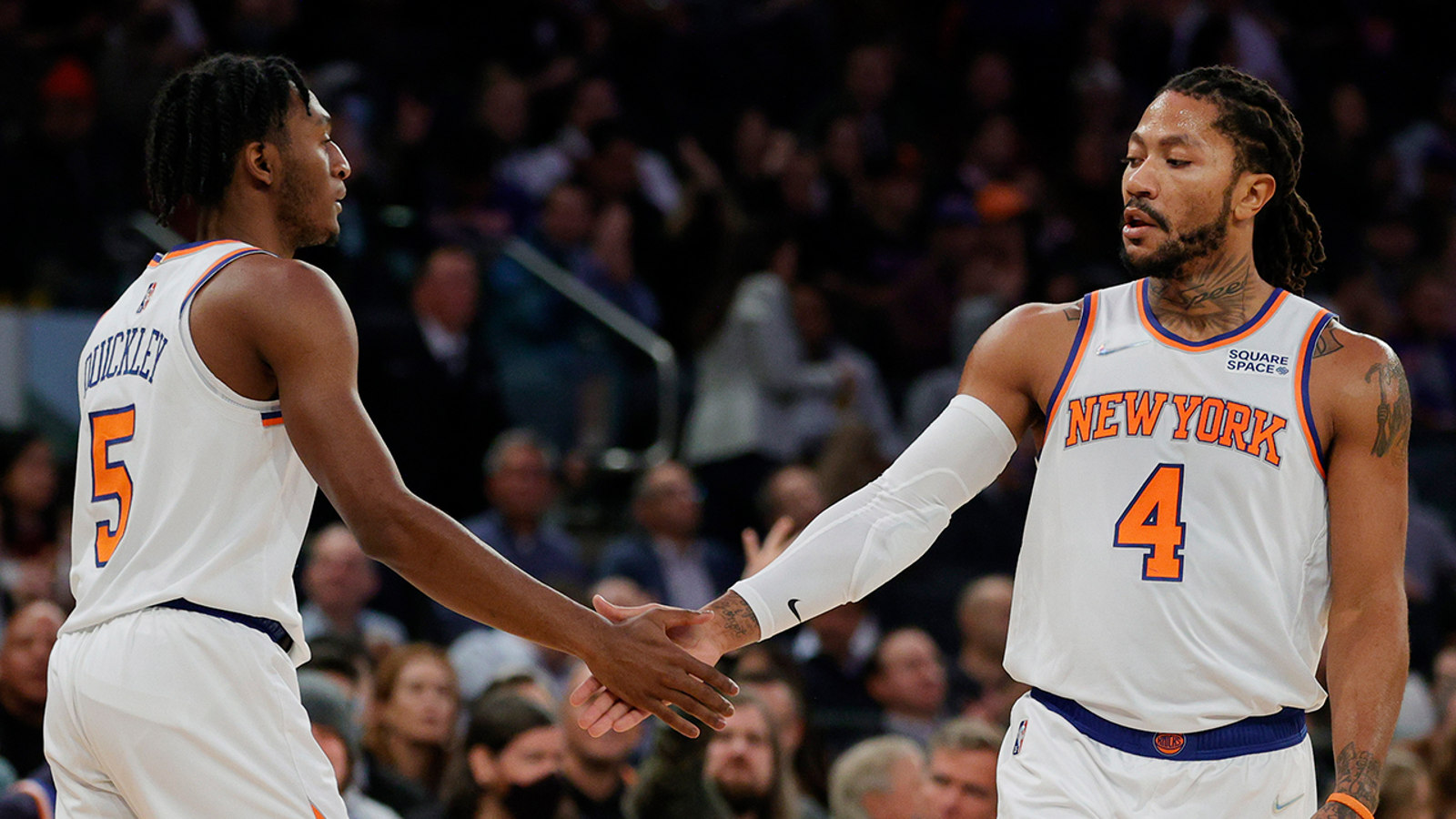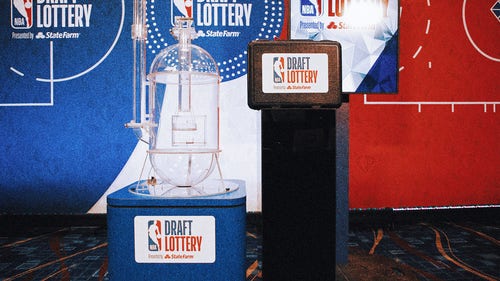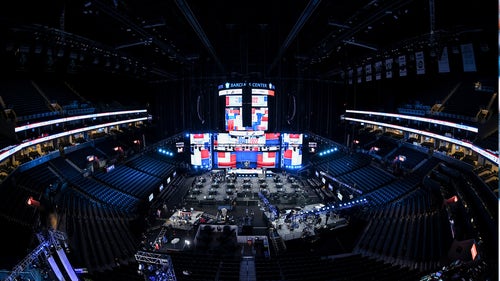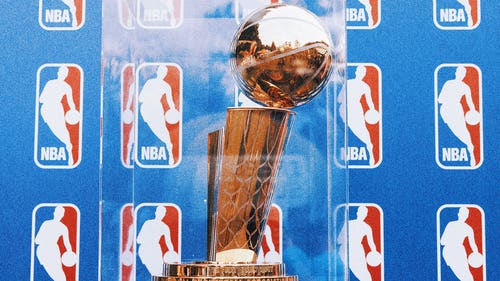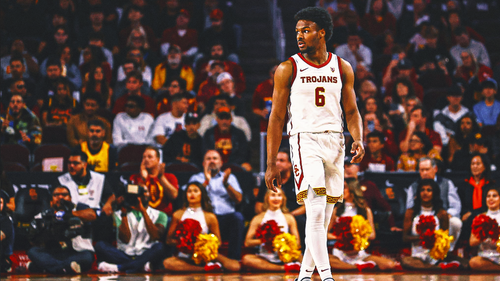
How to fix Knicks: Pay RJ Barrett, take ball from Julius Randle
By Yaron Weitzman
FOX Sports NBA Writer
Remember when Tom Thibodeau was the toast of New York? Or how about when Julius Randle was receiving MVP votes? Or when Leon Rose was viewed as the man with the plan?
It’s amazing how much can change in a year.
The Knicks have followed their first postseason trip in seven years with one of their more disappointing and disheartening campaigns in franchise history.
How can they rediscover last season’s magic? Glad you asked. Here’s a five-step guide to fix the Knicks.
RJ Barrett contact & lottery luck — Five ways to fix the New York Knicks
1. Take the ball out of Julius Randle’s hands
No player is more responsible for or better represents the Knicks’ nosedive. It’s not just that Randle has reverted to the low-effort, ball-dominant, inefficient scorer he was before last year’s breakout. It’s also the way he carries himself around the team.
Whether not hustling back on defense:
Or getting in the face of assistant coaches:
Or just general loafing:
As for his actual production, for all (deserved) praise Randle received last season for making better and quicker decisions and playing with more energy, the biggest difference for him was the ridiculous rate at which he canned contested jumpers, which I think we can now say was at least partially a result of playing in empty gyms.
FG% on long 2s:
* 2019-20: 39%
* 2020-21: 44%
* 2021-22: 35.1%
FG% pull-up 3s:
* 2019-20: 14.6%
* 2020-21: 40%
* 2021-22: 32.3%
Randle is not a bad player. What he is, though, is the type of player who can succeed only if everything is tailored around him. The problem is that he’s not good enough to warrant such treatment, meaning you face the choice of putting him at the center of your ecosystem and topping out as a mediocre team or aiming for something higher and undercutting his ability to perform.
Randle is in New York for the long run; he signed a large extension last offseason, one that takes him through at least 2025. I don’t think there’s a team out there interested in trading for him, unless it receives some sort of additional asset as a reward for doing so.
In the meantime, the Knicks have to make clear to Randle that the offense no longer revolves around him.
2. Create organizational cohesion
Leon Rose had eight months to decide how he wanted to attack his first full season at the helm of the New York Knicks. Yet as the 2020 draft was approaching, his head coach and chief strategist — both of whom Rose hired himself — were clashing over big-picture decisions.
Brock Aller, officially the team’s "Vice President, Basketball & Strategic Planning," wanted the Knicks to rebuild. Thibodeau, meanwhile, was clamoring for the team to go after veterans such as Gordon Hayward and Marcus Morris Sr. At times, according to sources (and as I’ve previously reported), the confrontations grew heated, with Thibodeau mocking Aller by referring to him as "Hinkie."
It’d be one thing for a team to be having these sorts of internal debates three years into a chief executive’s tenure. But for two of Rose’s initial hires to not be on the same page was something different — and a giant red flag to people within and around the organization.
The Knicks were able to overcome that internal discord in Rose’s first year. But this season we’ve seen how dangerous it can be when a team’s front office and head coach don’t see eye-to-eye.
Five reasons the Knicks are in trouble
Remember how early in the season, the Knicks’ starting lineup — featuring the newly signed backcourt of Kemba Walker and Evan Fournier — was playing the role of the Washington Generals for opposing units? High-ranking members of the front office told friends around the league that those struggles were the result of Thibodeau not deploying Fournier and Walker properly. Thibodeau, meanwhile, made his feelings about Walker clear when he banished him to the end of the bench after removing him from the starting lineup in November.
Then there was the whole Cam Reddish debacle. A refresher for those who need it: The Knicks in January traded a future first-round pick to the Atlanta Hawks in exchange for Reddish — the 10th pick in the 2019 draft — only for Thibodeau to refuse to play him.
As has been reported elsewhere, Thibodeau, according to multiple league sources, made clear to the front office before the deal that he wasn’t on board with the team trading for Reddish. Rose isn’t required to listen to Thibodeau, but he does need to make sure his head coach doesn’t get in the way of the front office’s roster-building efforts.
That can be done only by mapping out a plan forward — something Rose did not do upon being hired — and making sure his head coach and top executives understand what that plan is.
3. Pay RJ Barrett … just not too much
Pop quiz: Do you know who is the most recent Knicks first-round pick to sign a second contract with the team? If you guessed Charlie Ward, drafted all the way back in 1994, you are correct!
This brings us to RJ Barrett, who’s eligible for an extension this summer. Chances are he and his camp will ask for a max. He’s a No. 3 pick averaging just under 20 points per game (19.6).
If you’re the Knicks, that’s something you want to avoid. Barrett is a poor shooter (34.9 3PT%) and struggles to finish around the rim. It’s unlikely he'll ever develop into a player who can carry an offense.
But that doesn’t mean the Knicks shouldn’t try to lock him up. Sure, they could hold off, which would turn him into a restricted free agent next season and allow the Knicks to let the market dictate Barrett’s price and then match any deal he gets. But pouncing now could allow them to lock him into a lower deal.
The case for extending Barrett is simple: He’s not even 22 yet and has already proven himself to be a capable two-way player. He can score, is adept at knifing his way into the paint and is a willing defender with the size, speed and strength to defend across positions. Plus, people around him and the Knicks say he enjoys putting in the work.
If the Knicks can sign him to a deal along the lines of the four-year, $115 million extension that Jaylen Brown — also a former No. 3 pick — signed with the Boston Celtics in 2019, they’d be smart to do so. Sure, that could turn out to be a bit of an overpay. But think of it like this: Barrett is young and good. When was the last time the Knicks had a player who fit both those categories locked up?
4. Find a point guard
This is far from a new problem, but that doesn’t mean it’s not one in need of addressing. Just look at this list of the Knicks’ past 12 starting point guards on opening night — which doesn’t even include Kemba Walker last season.
The Knicks cannot enter next season with Alec Burks as their starter. Relying on Derrick Rose would be a mistake. Immanuel Quickley has shown flashes, but he’s best suited for a scoring role off the bench.
The Knicks no longer have the cap space to sign a starter, but they can trade for one or try the sign-and-trade route. One name to keep an eye on is Mavericks PG Jalen Brunson, whose father, Rick, was former agent Leon Rose’s first client; the families remain extremely close. Brunson will be an unrestricted free agent, meaning the Knicks would need to orchestrate a sign-and-trade, though they’d also likely need to compete with the Detroit Pistons, who have tons of cap room and need a point guard as well. There will also be other options out there.
Whether it’s Brunson or someone else, the Knicks need to find a true point guard and put the offense in his hands.
5. Lottery luck
The Knicks need a star — not for marketing reasons but because that’s the only way to win in the NBA. They know this, too. It’s one of the reasons James Dolan hired Leon Rose in the first place.
Rose is a longtime player agent who is well respected and connected. He also brought his longtime friend, William "Worldwide Wes" Wesley — the ubiquitous star-whisperer/power broker/consultant/advisor — with him to MSG. The two were supposed to leverage those connections to reel in a star. Dolan, according to sources, has recently expressed frustration that thus far they have failed to deliver.
Maybe the Knicks can pounce the next time a disgruntled star pops up, though I’m not sure who that player would be. Donovan Mitchell is the name you hear most from executives with other teams, but if he did want out of Utah and did ask to be dealt to New York, he’s signed through 2025, meaning there’s no reason Jazz boss Danny Ainge has to listen. Is a package of Barrett, Quickley, Obi Toppin and multiple picks really going to get it done?
Which brings us to the lottery. As of now, the Knicks have about a 10% chance of jumping into the top four. That's not great but not impossible. And anyway, it’s been a while since the Knicks have had any lottery luck.
Maybe they’re finally due.
Yaron Weitzman is an NBA writer for FOX Sports and the author of "Tanking to the Top: The Philadelphia 76ers and the Most Audacious Process in the History of Professional Sports." Follow him on Twitter @YaronWeitzman.







































































































































